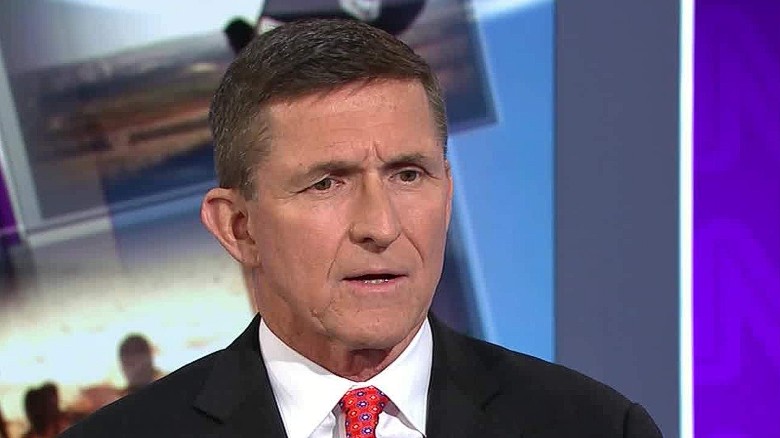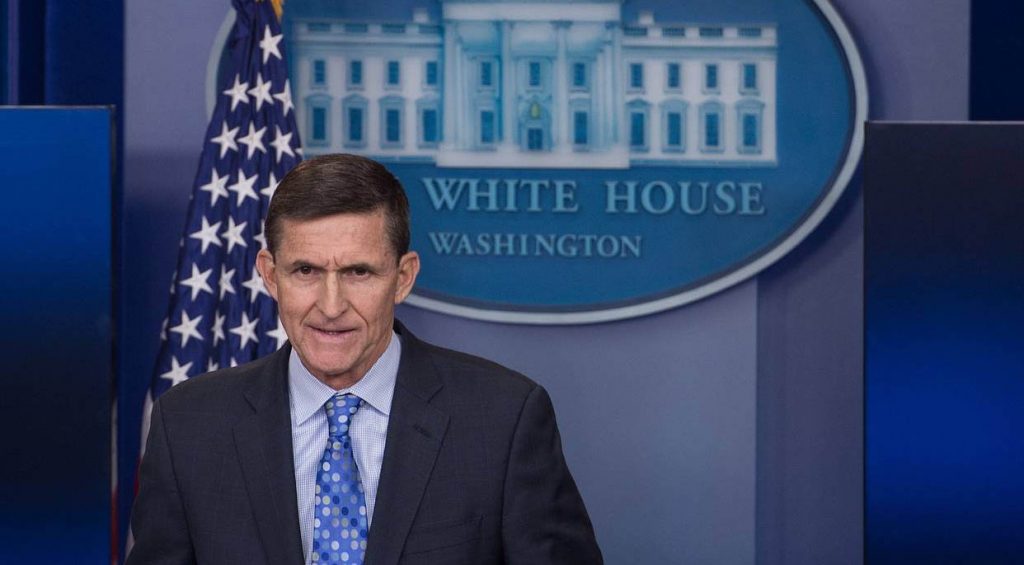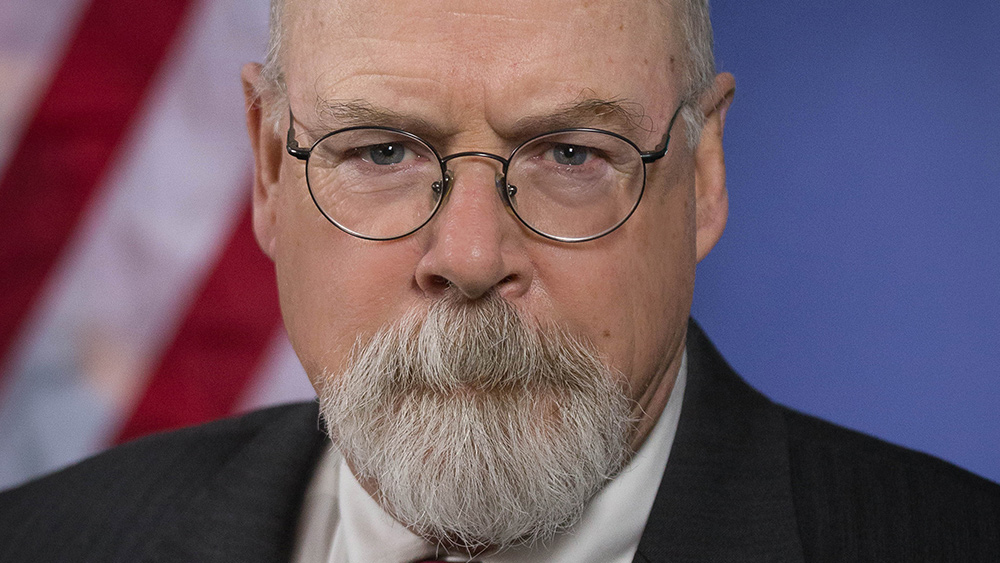
Advertisement
The FBI had no problem letting Hillary Clinton off the hook despite numerous attempts to hide the truth; Mike Flynn may not be so lucky.
(Article by Tyler Durden from Zerohedge.com)
Earlier today, media reports hit that FBI agents interviewed Michael Flynn when he was national security adviser in the first days of the Trump administration about his conversations with the Russian ambassador.
While it is not clear what he said in his interview, the FBI now adds that investigators “believed that Mr. Flynn was not entirely forthcoming, the officials said.” That avenue raises the stakes of what so far has been a political scandal that cost Mr. Flynn his job, and which Sean Spicer explained today was merely a matter of Trump “losing trust” in his Security advisor, because if authorities conclude that Mr. Flynn knowingly lied to the F.B.I., “it could expose him to a felony charge”, even though some have questioned how an illegally obtained transcript of his phone conversation could be admissable as evidence in a court of law.
The NYT adds that it was shortly after the F.B.I. interview, on Jan. 26, that the acting attorney general, Sally Yates, told the White House that Flynn was vulnerable to “Russian blackmail” because of inconsistencies between what he had said publicly and what intelligence officials knew to be true, as the WaPo reported last night, launching the sequence of events that ultimately led to Flynn’s resignation. At issue is a conversation during the presidential transition in which Flynn spoke to the Russian ambassador about sanctions levied against Russia by the Obama administration. The call spurred an investigation by the FBI into whether Flynn had violated the rarely invoked Logan Act, which prohibits private citizens from negotiating with foreign governments in disputes with the United States.

It was here that the NSA, which routinely eavesdrops on calls involving high-ranking foreign diplomats, got involved and recorded the phone call. While officials have said that Flynn was not a focus of the eavesdropping, in retrospect that now appears suspect.
Meanwhile, as clouds gather over Flynn, the White House battled Tuesday to insulate Donald Trump from the scandal over a top aide’s contacts with Russia, as calls grew for an independent investigation. Trump’s young presidency has been “thrown into turmoil”, according to the AFP, after the forced resignation of his national security advisor and long-time supporter Michael Flynn.
The White House said that after weeks of internal investigation – which turned up no wrongdoing but “eroded” trust – Trump had requested and accepted Flynn’s resignation late Monday. Flynn is the third Trump aide to step back amid questions about his ties to Russia since the mogul began his improbable White House bid.
The unprecedented early resignation of a key member of staff has rocked an administration already buffeted by leaks, infighting and legal defeats. Amid the tumult, the White House denied that Trump had instructed Flynn to discuss the possibility that Obama-era sanctions would be rolled back.
“No, absolutely not. No, no, no,” said White House spokesman Sean Spicer, when asked whether such a conversation took place.
Spicer said the president “instinctively thought that General Flynn did not do anything wrong and the White House counsel’s review corroborated that,” adding that the counsel “determined that there is not an illegal issue, but rather a trust issue.” “The evolving and eroding level of trust as a result of this situation and a series of other questionable instances is what led the president to ask for General Flynn’s resignation.”
In his first public defense following last night’s tumultuous events, Flynn told The Daily Caller before his resignation on Monday that he “crossed no lines” during his conversations with the Russian Ambassador to the U.S. In an effort to defend himself, Flynn pointed to the government leaks about his December conversation as a factor that led to the media furor. He described them as part of a larger trend of government leaks in this administration.
Trump agreed on Tuesday morning when he took to Twitter to insist that “The real story here is why are there so many illegal leaks coming out of Washington?”
Spicer echoed his boss’ statement saying “People who are entrusted with national security secrets, classified information, are leaking it out. That’s a real concern for this president” and then he pivoted toward Russia. As reported previously, Spicer next insisted that Trump “has been incredibly tough on Russia.” In a new clear shift in sentiment, and a hardening of the US line on Russia, Spicer added that “President Trump has made it very clear he expects the Russian government to de-escalate violence in the Ukraine and return Crimea.”
The State Department meanwhile expressed concern that Russia is in breach of the Intermediate-Range Nuclear Forces Treaty, after reports that Moscow had deployed an operational ground-launched cruise missile unit.
For now, the White House’s efforts are likely to do little to mitigate Congressional concerns about Russia’s influence in US politics. On Tuesday the White House admitted the president had known as early as January 26 that Flynn may have made misleading statements, apparently contradicting Trump’s statement last Friday that he was unaware of the issue.
Republicans and Democrats in Congress have now called for an investigation into what occurred, although they differ sharply on the scope and powers. “This. Is. Not. Normal.” said Democratic Senator Elizabeth Warren, insisting “Trump owes Americans a full account” of his administration’s dealings with Moscow before and after the 2016 election.
Making things worse for the president, the US Senate’s top Republican Mitch McConnell said it was “highly likely” that Flynn would have to testify before an intelligence panel, potentially heaping pressure on Trump. The CIA, FBI and other intelligence agencies have already investigated Moscow’s influence over the 2016 vote, concluding the Kremlin tried to sway it in Trump’s favor.
Various committees in the Republican-controlled Congress are looking into Russia’s election-related hacking and the Trump campaign’s links to Moscow.
For now the focus shifts on the pressing issue at hand – Flynn’s immediate replacement: as discussed this afternoon, after Flynn quit, the White House said Trump had named retired lieutenant general Keith Kellogg, a decorated Vietnam war veteran who was serving as a director on the Joint Chiefs of Staff, to be interim national security advisor. However, as both WaPo and the NYT reports, the person who has emerged as the leading candidate to replace Flynn is Vice Admiral Robert Harward, a senior naval officer who served under President Donald Trump’s Defense Secretary James Mattis.
Harward is the Chief Executive Officer for Lockheed Martin in the UAE – in which this role “he is responsible for all aspects of the company’s business interests in the UAE, including strategy, operations, growth and execution of Lockheed Martin programs”
Read more at: Zerohedge.com
Submit a correction >>
This article may contain statements that reflect the opinion of the author
Advertisement
Advertisements
















